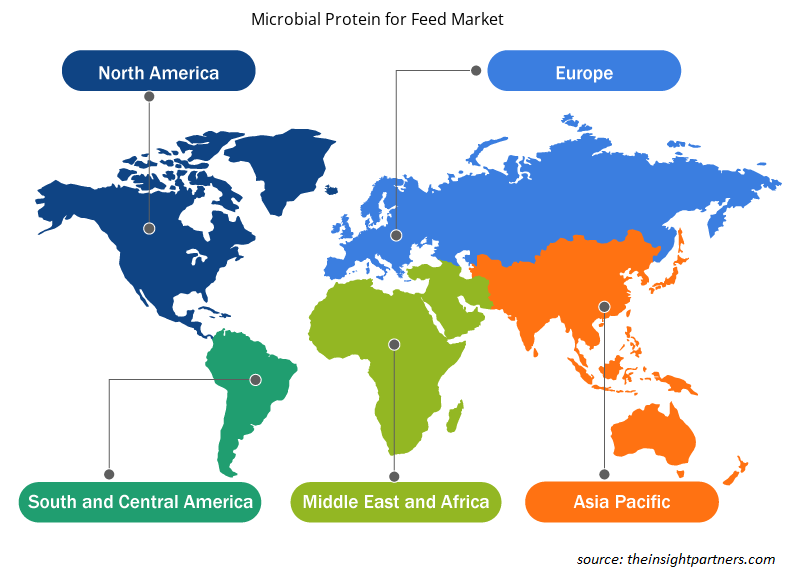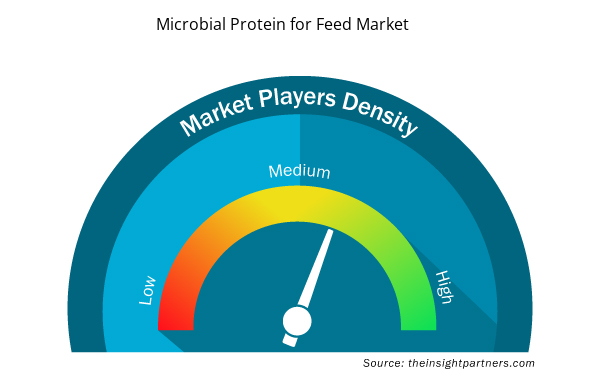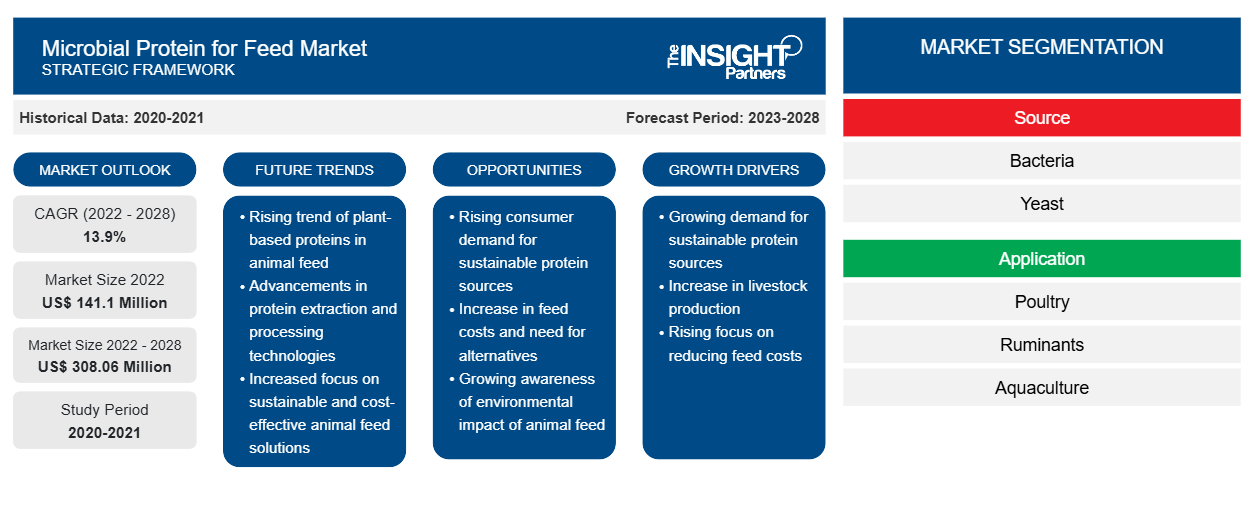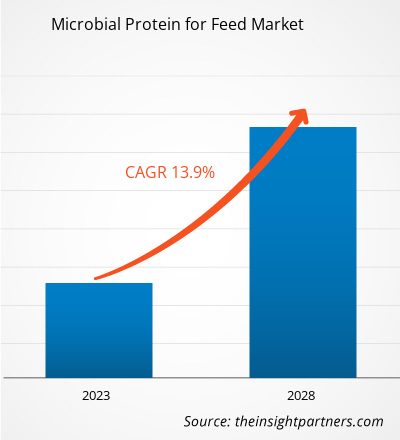飼料用微生物タンパク質市場規模は、2022年の141,095.88千米ドルから2028年には308,055.17千米ドルに成長すると予想されており、2022年から2028年にかけて13.9%のCAGRを記録すると推定されています。CAGR of 13.9% from 2022 to 2028.
微生物タンパク質は、粗タンパク質の重要な供給源の 1 つです。動物飼料に微生物タンパク質を含めると、多くの栄養上の利点があります。微生物タンパク質には 70% を超える粗タンパク質が含まれていますが、大豆ミールには 40~50%、魚粉には 60~65% の粗タンパク質が含まれています。さらに、微生物タンパク質は、魚粉と比較してバリン、トリプトファン、イソロイシン、ロイシンが多く含まれるなど、理想的なアミノ酸プロファイルを備えています。微生物タンパク質は、大豆や魚粉などの従来のタンパク質源の優れた代替品の 1 つです。微生物タンパク質は、細菌、酵母、真菌、または微細藻類を使用してリアクターで発酵させた工業用ガス (二酸化炭素、メタン、天然ガス)、廃水、家禽廃棄物 (羽毛) などの費用対効果の高い基質を使用して生産されます。このように、家畜の食事に微生物タンパク質を追加することによるさまざまな栄養上の利点と、持続可能性への懸念の高まりが、飼料用微生物タンパク質市場の成長を促進しています。soymeal contains 40–50% crude protein, and fish meal contains 60–65% crude protein. Moreover, it has an ideal amino acid profile, including higher valine, tryptophan, isoleucine, and leucine compared to fish meals. Microbial protein is one of the excellent alternatives to conventional sources of proteins such as soybean and fish meal. It is produced using cost-effective substrates such as industrial gases (carbon dioxide, methane, and natural gas), wastewater, and poultry waste (feathers) fermented in a reactor using bacteria, yeast, fungi, or microalgae. Thus, various nutritional benefits of adding microbial protein to livestock diets and rising sustainability concerns are driving the
2021年、ヨーロッパは飼料用微生物タンパク質市場で最大のシェアを占めました。欧州飼料製造業者連盟(FEFAC)によると、アフリカ豚コレラ(ASF)が同地域で引き続き蔓延し、養豚業に影響を与えているにもかかわらず、2020年の豚用飼料生産は2.9%増加しました。ドイツの輸出禁止措置の恩恵を受けて、いくつかのヨーロッパ諸国は中国への輸出を増やし、2020年には豚用飼料生産が急増しました。動物飼料生産量の上昇に伴い、動物由来および植物由来の飼料添加物は今日では環境に優しいとは考えられていないため、製造業者は持続可能な飼料添加物を求めています。大豆などの輸入飼料原料は、天然資源と生物多様性を脅かしています。そのため、動物飼料製造業者の間では微生物タンパク質の需要が高まっています。
要件に合わせてレポートをカスタマイズする
このレポートの一部、国レベルの分析、Excelデータパックなど、あらゆるレポートを無料でカスタマイズできます。また、スタートアップや大学向けのお得なオファーや割引もご利用いただけます。
- このレポートの主要な市場動向を入手してください。この無料サンプルには、市場動向から見積もりや予測に至るまでのデータ分析が含まれます。
COVID-19パンデミックが飼料用微生物タンパク質市場に与える影響
飼料業界は、原材料と労働者の不足、原材料価格の高騰、ロックダウン、渡航禁止、貿易制限、製造ユニットの閉鎖、および世界中で政府が課したその他の制限による流通ネットワークの混乱など、重大な課題に直面しました。これにより、動物飼料業界のさまざまな企業の製造活動が妨げられ、結果として飼料原料の価格が上昇しました。欧州連合では、加盟国の約3分の2がパンデミック中の畜産業界の飼料価格の急騰を指摘しました。さらに、パンデミックのピーク時には、中国はほとんどの地域で家畜と家禽の取引と屠殺市場を閉鎖しました。畜産業界におけるこのような障壁は飼料原料の需要を妨げ、パンデミック中の飼料用微生物タンパク質の需要に悪影響を及ぼしました。
2021年、各国政府が以前に課していた制限の緩和を発表したことで、さまざまな経済が再開し、世界市場が活性化しました。さらに、製造業者はフル稼働を許可され、需要と供給のギャップやその他の影響を克服するのに役立ちました。
市場分析
政府と民間セクターの投資が飼料用微生物タンパク質市場の成長にプラスの影響を与える
気候変動や土地や水などの天然資源の過剰利用は、畜産・動物飼料産業における持続可能性に関する主要な懸念事項です。その結果、世界中のさまざまな国の政府は、持続可能な方法で動物飼料や原料を製造する企業に資金を提供し、全体的な炭素排出量を削減し、循環型経済の成長をサポートしています。政府や民間投資家はまた、動物の栄養のための最も持続可能なタンパク質源の1つであるため、微生物から動物飼料タンパク質を作る企業を支援しています。たとえば、2022年2月、農業廃棄物や木材残渣を処理して動物飼料や食品用途向けの高品質タンパク質を製造するフランス系アメリカ人のArbiomは、フランスのRelance投資プログラムから1,350万米ドルの投資を受けました。投資を受けた後、同社はフランスで最初の商業生産工場を建設すると発表しました。したがって、飼料用微生物タンパク質市場への政府と民間部門の投資の増加は、予測期間中の市場成長にプラスの影響を与えると予想されます。
ソースインサイト
供給源に基づいて、世界の飼料用微生物タンパク質市場は、細菌、酵母、その他に分類されます。細菌セグメントは、2021年に世界の飼料用微生物タンパク質市場で最大のシェアを占め、2022年から2028年にかけて最高のCAGRを記録すると予想されています。細菌は、酵母や他の微生物と比較して最高の成長率を示しています。さらに、細菌培養を使用して生産されるタンパク質の量は最大です。さらに、粗タンパク質が70%を超え、必須アミノ酸プロファイルが良好です。さまざまな研究によると、1,000 kgの細菌は、大豆や肉牛よりも高品質のタンパク質を生産します。したがって、細菌は、動物飼料用の費用対効果が高く、最も速いタンパク質源の1つです。これらすべての要因が、このセグメントの市場を牽引しています。
飼料用微生物タンパク質の世界市場で活動している主要企業には、Calysta, Inc.、Avecom、Arbiom、KnipBio、ICC、Alltech などがあります。市場プレーヤーは、顧客の需要を満たすために高品質の製品を提供することに注力しています。また、研究開発活動、パートナーシップ、拡張への投資などの戦略にも注力しています。
飼料に使用される微生物タンパク質
飼料用微生物タンパク質市場の地域別分析
予測期間を通じて飼料用微生物タンパク質市場に影響を与える地域的な傾向と要因は、Insight Partners のアナリストによって徹底的に説明されています。このセクションでは、北米、ヨーロッパ、アジア太平洋、中東、アフリカ、南米、中米にわたる飼料用微生物タンパク質市場のセグメントと地理についても説明します。

- 飼料用微生物タンパク質市場の地域別データを入手
飼料用微生物タンパク質市場レポートの範囲
| レポート属性 | 詳細 |
|---|---|
| 2022年の市場規模 | 1億4,110万米ドル |
| 2028年までの市場規模 | 3億806万米ドル |
| 世界のCAGR(2022年 - 2028年) | 13.9% |
| 履歴データ | 2020-2021 |
| 予測期間 | 2023-2028 |
| 対象セグメント | ソース別
|
| 対象地域と国 | 北米
|
| 市場リーダーと主要企業プロフィール |
|
飼料用微生物タンパク質市場のプレーヤー密度:ビジネスダイナミクスへの影響を理解する
飼料用微生物タンパク質市場は、消費者の嗜好の変化、技術の進歩、製品の利点に対する認識の高まりなどの要因により、エンドユーザーの需要が高まり、急速に成長しています。需要が高まるにつれて、企業は提供を拡大し、消費者のニーズを満たすために革新し、新たなトレンドを活用し、市場の成長をさらに促進しています。
市場プレーヤー密度とは、特定の市場または業界内で活動している企業または会社の分布を指します。これは、特定の市場スペースに、その規模または総市場価値と比較して、どれだけの競合相手 (市場プレーヤー) が存在するかを示します。
飼料用微生物タンパク質市場で事業を展開している主要企業は次のとおりです。
- 株式会社カリスタ
- アベコム
- アルビオム
- クニップバイオ
- 国際刑事裁判所
免責事項:上記の企業は、特定の順序でランク付けされていません。

- 飼料用微生物タンパク質市場のトップキープレーヤーの概要を入手
主な開発:
2022年6月、Calysta Inc.とAdisseoは合弁会社「Calysseo」を設立し、中国重慶市に初の工業規模の生産施設を開設し、年間2万トンの水産飼料用微生物タンパク質FeedKindを生産します。中国でのFeedKindの生産と販売が成功したことを受けて、合弁パートナーは今後数年間で生産能力を年間8万トンに拡大する計画です。
レポートの注目点
- 飼料用微生物タンパク質市場における進歩的な業界動向は、プレーヤーが効果的な長期戦略を策定するのに役立ちます。
- 先進国と発展途上国が採用するビジネス成長戦略
- 2020年から2028年までの飼料用微生物タンパク質市場の定量分析
- 飼料用微生物タンパク質の世界需要の推定
- 飼料用微生物タンパク質の世界市場の成長に影響を与える政治的、経済的、社会的、技術的な要因を示す PEST 分析。
- 競争市場の状況を理解するための最近の動向
- 飼料用微生物タンパク質市場における市場動向と展望、成長を牽引・抑制する要因
- 商業的利益の基盤となる市場戦略を強調し、市場の成長につながる意思決定プロセスを支援する
- さまざまなノードにおけるセルフタンニング製品の市場規模
- 市場の詳細な概要とセグメンテーション、および飼料産業の動向のための微生物タンパク質
- 有望な成長機会があるさまざまな地域の飼料用微生物タンパク質市場の規模
- 過去2年間の分析、基準年、CAGRによる予測(7年間)
- PEST分析とSWOT分析
- 市場規模価値/数量 - 世界、地域、国
- 業界と競争環境
- Excel データセット



Report Coverage
Revenue forecast, Company Analysis, Industry landscape, Growth factors, and Trends

Segment Covered
This text is related
to segments covered.

Regional Scope
North America, Europe, Asia Pacific, Middle East & Africa, South & Central America

Country Scope
This text is related
to country scope.
よくある質問
Rising demand for sustainable feed protein and nutritional benefits of microbial protein over conventional feed protein sources are some of the key driving factors for the microbial protein for feed market.
Based on application, poultry is the fastest-growing segment in the microbial protein for feed market as the demand for poultry meat is growing rapidly with the majority of people preferring chicken over beef and pork due to its low fat and high protein content.
Based on the source, the bacteria segment accounted for the largest revenue share as the bacteria are among the ideal sources for producing microbial protein or single-cell protein (SCP).
Europe accounted for the largest share of the global microbial protein for feed market. With the rising levels of animal feed production, manufacturers are looking for sustainable feed additives, as animal-sourced and plant-sourced feed additives are not perceived as environment-friendly nowadays. Imported feed materials, such as soy, threaten natural resources and biodiversity. Thus, the demand for microbial protein is increasing among animal feed manufacturers in the region.
The major players operating in the global microbial protein for feed market are CALYSTA INC.; Avecom; Arbiom; KnipBio; ICC; and Alltech among few others.
Manufacturers of microbial protein are taking strategic initiatives such as plant capacity expansion and new product development to expand their operations across different geographies is anticipated to create lucrative opportunities for the microbial protein for feed market during the forecast period.
Trends and growth analysis reports related to Food and Beverages : READ MORE..
The List of Companies - Microbial Protein for Feed Market
- CALYSTA INC.
- Avecom
- Arbiom
- KnipBio
- ICC
- Alltech
- Unibio
- Stringbio
- Deep Branch
- EniferBio
The Insight Partners performs research in 4 major stages: Data Collection & Secondary Research, Primary Research, Data Analysis and Data Triangulation & Final Review.
- Data Collection and Secondary Research:
As a market research and consulting firm operating from a decade, we have published and advised several client across the globe. First step for any study will start with an assessment of currently available data and insights from existing reports. Further, historical and current market information is collected from Investor Presentations, Annual Reports, SEC Filings, etc., and other information related to company’s performance and market positioning are gathered from Paid Databases (Factiva, Hoovers, and Reuters) and various other publications available in public domain.
Several associations trade associates, technical forums, institutes, societies and organization are accessed to gain technical as well as market related insights through their publications such as research papers, blogs and press releases related to the studies are referred to get cues about the market. Further, white papers, journals, magazines, and other news articles published in last 3 years are scrutinized and analyzed to understand the current market trends.
- Primary Research:
The primarily interview analysis comprise of data obtained from industry participants interview and answers to survey questions gathered by in-house primary team.
For primary research, interviews are conducted with industry experts/CEOs/Marketing Managers/VPs/Subject Matter Experts from both demand and supply side to get a 360-degree view of the market. The primary team conducts several interviews based on the complexity of the markets to understand the various market trends and dynamics which makes research more credible and precise.
A typical research interview fulfils the following functions:
- Provides first-hand information on the market size, market trends, growth trends, competitive landscape, and outlook
- Validates and strengthens in-house secondary research findings
- Develops the analysis team’s expertise and market understanding
Primary research involves email interactions and telephone interviews for each market, category, segment, and sub-segment across geographies. The participants who typically take part in such a process include, but are not limited to:
- Industry participants: VPs, business development managers, market intelligence managers and national sales managers
- Outside experts: Valuation experts, research analysts and key opinion leaders specializing in the electronics and semiconductor industry.
Below is the breakup of our primary respondents by company, designation, and region:

Once we receive the confirmation from primary research sources or primary respondents, we finalize the base year market estimation and forecast the data as per the macroeconomic and microeconomic factors assessed during data collection.
- Data Analysis:
Once data is validated through both secondary as well as primary respondents, we finalize the market estimations by hypothesis formulation and factor analysis at regional and country level.
- Macro-Economic Factor Analysis:
We analyse macroeconomic indicators such the gross domestic product (GDP), increase in the demand for goods and services across industries, technological advancement, regional economic growth, governmental policies, the influence of COVID-19, PEST analysis, and other aspects. This analysis aids in setting benchmarks for various nations/regions and approximating market splits. Additionally, the general trend of the aforementioned components aid in determining the market's development possibilities.
- Country Level Data:
Various factors that are especially aligned to the country are taken into account to determine the market size for a certain area and country, including the presence of vendors, such as headquarters and offices, the country's GDP, demand patterns, and industry growth. To comprehend the market dynamics for the nation, a number of growth variables, inhibitors, application areas, and current market trends are researched. The aforementioned elements aid in determining the country's overall market's growth potential.
- Company Profile:
The “Table of Contents” is formulated by listing and analyzing more than 25 - 30 companies operating in the market ecosystem across geographies. However, we profile only 10 companies as a standard practice in our syndicate reports. These 10 companies comprise leading, emerging, and regional players. Nonetheless, our analysis is not restricted to the 10 listed companies, we also analyze other companies present in the market to develop a holistic view and understand the prevailing trends. The “Company Profiles” section in the report covers key facts, business description, products & services, financial information, SWOT analysis, and key developments. The financial information presented is extracted from the annual reports and official documents of the publicly listed companies. Upon collecting the information for the sections of respective companies, we verify them via various primary sources and then compile the data in respective company profiles. The company level information helps us in deriving the base number as well as in forecasting the market size.
- Developing Base Number:
Aggregation of sales statistics (2020-2022) and macro-economic factor, and other secondary and primary research insights are utilized to arrive at base number and related market shares for 2022. The data gaps are identified in this step and relevant market data is analyzed, collected from paid primary interviews or databases. On finalizing the base year market size, forecasts are developed on the basis of macro-economic, industry and market growth factors and company level analysis.
- Data Triangulation and Final Review:
The market findings and base year market size calculations are validated from supply as well as demand side. Demand side validations are based on macro-economic factor analysis and benchmarks for respective regions and countries. In case of supply side validations, revenues of major companies are estimated (in case not available) based on industry benchmark, approximate number of employees, product portfolio, and primary interviews revenues are gathered. Further revenue from target product/service segment is assessed to avoid overshooting of market statistics. In case of heavy deviations between supply and demand side values, all thes steps are repeated to achieve synchronization.
We follow an iterative model, wherein we share our research findings with Subject Matter Experts (SME’s) and Key Opinion Leaders (KOLs) until consensus view of the market is not formulated – this model negates any drastic deviation in the opinions of experts. Only validated and universally acceptable research findings are quoted in our reports.
We have important check points that we use to validate our research findings – which we call – data triangulation, where we validate the information, we generate from secondary sources with primary interviews and then we re-validate with our internal data bases and Subject matter experts. This comprehensive model enables us to deliver high quality, reliable data in shortest possible time.


 このレポートの無料サンプルを入手する
このレポートの無料サンプルを入手する